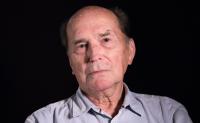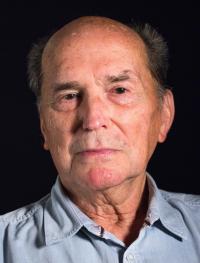There is no easy advise to survive totalitarian power

Stáhnout obrázek
Petr Čapek was born on December 26, 1936, in Prague, into a family of a parson of Czech Brethren Church. His life was influenced by his uncles, Jan Blahoslav and Milíč Čapeks, same as the background of the evangelical community at Žižkov. After his grammar school he started working as a tram-driver and a labourer in the rubber industry, after another year he was accepted at the Evangelical Theological Faculty. He served as a parson in Mariánské Lázně, Merklín near Pilsen and in Děčín. He worked with reform theologians from Nová orientace, was followed by the Secret Police and repeatedly interrogated. To prevent him from working with the youth, who he had allegedly influenced in a negative way, his approval to carry out the spiritual service was withdrawn for some time. During his stay in Děčín he organised many concert, lectures and meetings.

